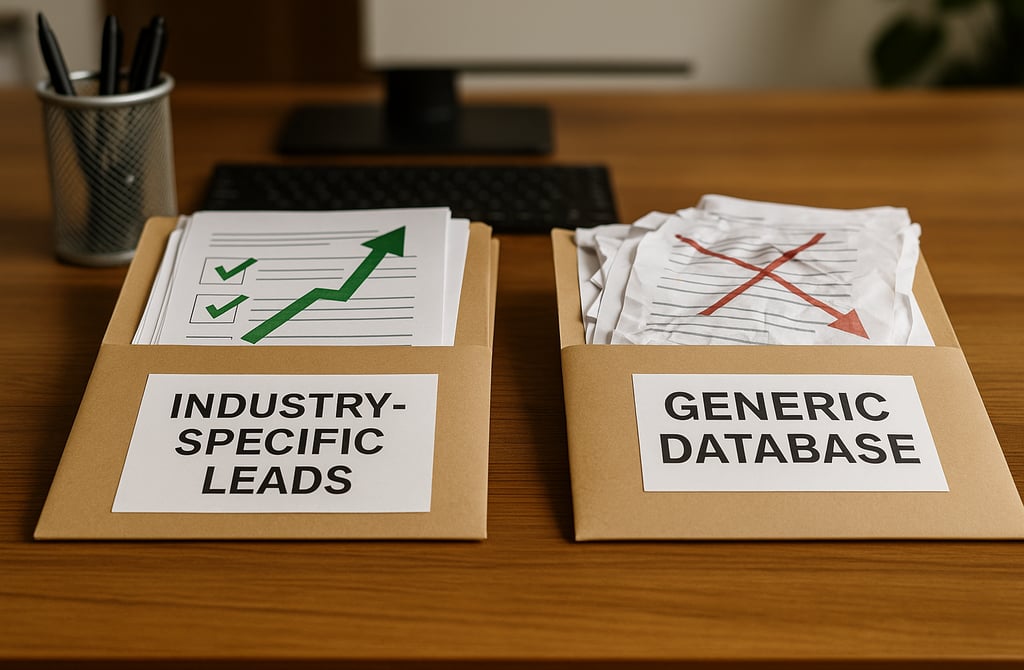Industry-Specific B2B Leads: Why They Convert Better Than Generic Databases
Discover why industry-specific B2B leads convert higher than generic databases. Learn how focused targeting, verified data, and buyer intent drive better outreach results.
B2B LEAD GENERATIONVERIFIED DATAINDUSTRY-SPECIFIC LEADSCOLD EMAIL OUTREACH
CapLeads Team
11/14/20253 min read


Industry-Specific B2B Leads: Why They Convert Better Than Generic Databases
Most founders eventually learn the same painful lesson: not all B2B leads are created equal. You can have a list of 10,000 contacts, but if they’re scattered across random industries, titles, and company types, you end up pushing campaigns that never gain traction.
This is why industry-specific B2B leads consistently outperform generic databases — not by a small margin, but by 2x to 5x in reply rate, conversion rate, and revenue created per send. And the reason is simple: precision always beats volume.
Below is a breakdown of why niche-focused, verified data wins every time.
1. Industry Intent Is Built-In
When your list is industry-specific, every contact is already operating in the same world, same pain points, same workflows, and same buying triggers.
This makes your outreach instantly relevant.
Generic databases force you to send broad, diluted messaging that tries to appeal to “everyone.”
Industry-specific data lets you craft messaging that speaks directly to the prospect’s reality.
Relevance = attention.
Attention = replies.
Replies = sales conversations.
2. Cleaner Targeting Means Higher Conversion Rates
When your list contains only the industries you want to sell to, several things automatically improve:
Better open rates
Higher reply rates
Lower spam reports
More qualified conversations
Higher close rate
Because the message matches the audience.
A construction company VP doesn’t want the same pitch as a marketing agency owner.
A SaaS CFO doesn’t care about the same problems as a real estate broker.
Industry alignment instantly boosts performance.
3. You Avoid Wasting Sends on Low-Relevance Prospects
Cold email has limits:
• sending volume
• domain health
• warmup capacity
• list size
• number of touchpoints
Wasting those sends on prospects who were never a fit kills your ROI.
A generic database forces you to “spray and pray.”
Industry-specific data ensures every email has a real chance of turning into revenue.
This makes every campaign more cost-efficient.
4. Industry-Specific Leads Produce Cleaner Personalization
Personalization is powerful — but only when the foundation is right.
Industry-specific lists let you use:
industry-specific pain points
industry-specific benefits
industry-specific KPIs
niche buying cycles
niche language and terminology
That level of accuracy is impossible with mixed-data lists.
The more aligned your personalization, the more your campaign feels hand-crafted — even when it’s automated.
5. It Reduces Bounce Rates and Protects Domain Health
Generic databases usually contain old, recycled, scraped, or bloated data.
This is why bounce rates on random lists often hit 5 to 20 percent.
High bounces destroy your domain health.
Industry-specific datasets, especially when verified, have significantly lower bounce rates. At CapLeads, our industry-specific datasets consistently achieve:
0.8 percent – 1.5 percent bounce rate
because every list is cleaned and validated at the industry level.
Better data = better deliverability = more conversions.
6. It Cuts Down Your Time-to-Conversation
A founder’s biggest bottleneck isn’t leads — it’s time.
Industry-specific data reduces wasted touches and accelerates the point where someone says:
“Yeah, we’re actually looking at this right now.”
When your entire list shares the same business model, buying cycle, and operational structure, conversations move faster and become meaningful quicker.
7. Your Sales Team Gets Higher-Quality Conversations
Generic lists create more noise than opportunities.
Your team spends time on:
wrong industries
wrong roles
irrelevant buyers
non-decision-makers
businesses that would never purchase your service
Industry-specific targeting filters all that out.
Your pipeline becomes filled with buyers who actually care.
8. The Data Ages Better Over Time
Generic data goes stale fast.
Industries constantly shift, and mixed databases don’t benefit from any particular niche insight.
Industry-specific databases, on the other hand:
are refreshed more often
maintain accuracy longer
have less churn
are easier to validate
stay relevant because the roles and structures are predictable within each sector
This is why CapLeads invests heavily in per-sector data validation, not generic scraping.
Final Thoughts
If you rely on cold email, outbound, or pipeline building in any form, using an industry-specific dataset isn’t optional — it’s a competitive advantage.
Generic databases give you volume.
Industry-specific data gives you conversions.
And conversions are the only metric that matters.
Related Posts
The 4 Metrics That Actually Prove Data ROI (And Why Clicks Don’t Matter)
How a PH-Based Client Ordered 10,000 Verified Leads Across Construction, Real Estate, and Accounting
The Data Ethics Problem No One in B2B Wants to Talk About
CapLeads Expands to 55 Industries — Setting a New Standard in Verified B2B Data
Who Benefits Most from Verified Building Products Company Leads (and Why)
Unlocking Opportunities: Verified Leads for Machinery Companies
Discover New Opportunities with Verified Commercial Products Company Leads
How to Vet a Lead Provider Before You Buy: A Founder's Checklist
Why We Stopped Talking About Validation and Started Talking About Revenue
Data Fatigue Is Real - Here's How Smart Founders Beat It
The Real Story Behind CapLeads' .15-Cent-Per-Lead Promise
Why Cold Email Outreach Will Still Outperform Ads in 2026?
Why You Should Buy Your B2B Leads from CapLeads (and Not Just Any Provider)
Behind the Inbox: What We Learned from 30,000 Cold Email Replies
Why Investors Are Quietly Betting on Data Aggregators, Not Agencies
How to Turn a 97% Deliverability Rate Into Actual Sales Conversations
Top B2B Industry Datasets We Offer (And the Industries We Don’t Support)
How to Use Verified Data to Train Your AI Prospecting Tools for Better B2B Outreach
Connect
Get verified leads that drive real results for your business today.
www.capleads.org
© 2025. All rights reserved.
Serving clients worldwide.
CapLeads provides verified B2B datasets with accurate contacts and direct phone numbers. Our data helps startups and sales teams reach C-level executives in FinTech, SaaS, Consulting, and other industries.
